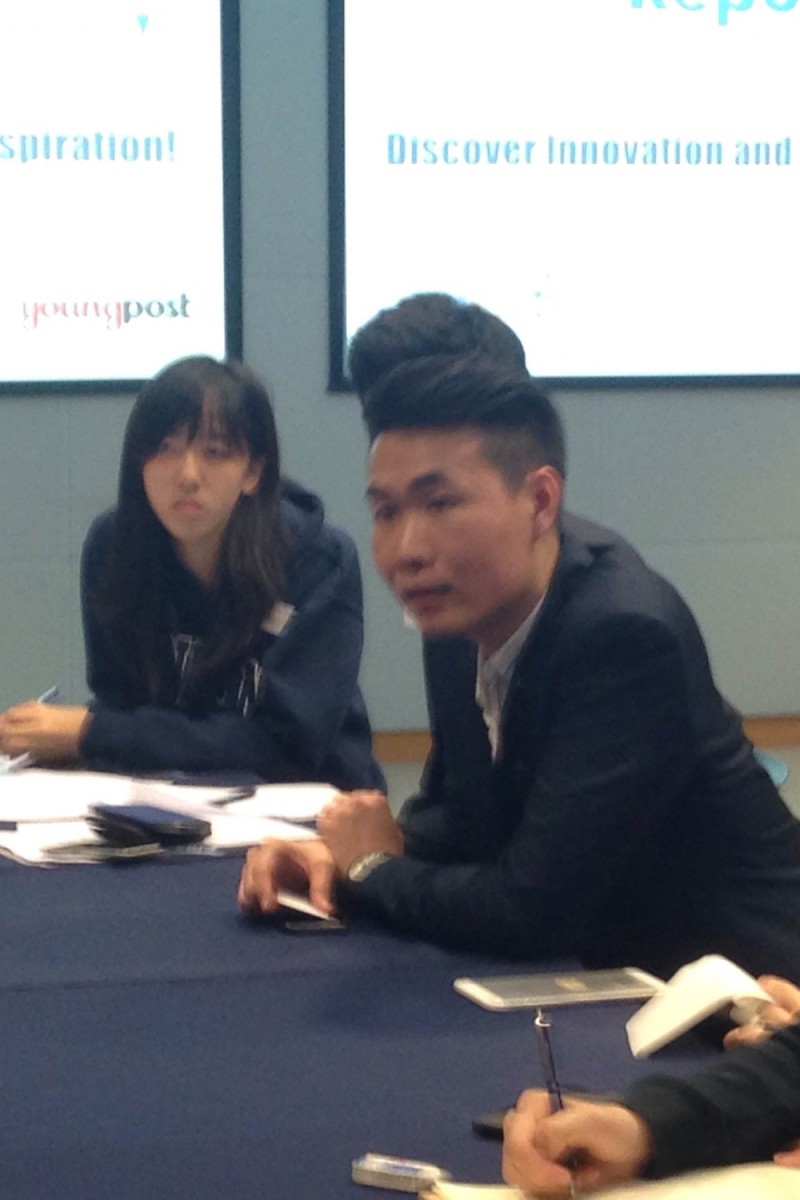
Students get a chance to compete in writing about new technologies, innovation and running a start-up.
 Learning about the pleasures and hardships of running one's own company from Dennis Kwan (third from right), founder of QBS System
Learning about the pleasures and hardships of running one's own company from Dennis Kwan (third from right), founder of QBS SystemIf your grandparents are living alone, an upcoming healthcare watch may ease your concern for their safety. Among other things, the watch can detect a sudden movement of tumbling and automatically send out distress signals, before its owner actually falls.
The nifty invention is developed by QBS System, a company established in 2011 by its engineering director Dennis Kwan. By winning a gold award for “Best RFID implementation” in 2013, QBS has ensured its leading position in the innovative industry in Hong Kong.
“The mission of innovation is [to create] a better life,” says Kwan.
In two months, his creative watch, which can also monitor and record various physical conditions in the blink of an eye, will be applied at an elderly home in Yuen Long. From then on, taking the blood pressure of the elderly residents, for instance, will be more efficient and accurate. If the product will be widely adopted, the price of each watch could be reduced to as little as $200, Kwan estimates.
Population ageing has created a drastic shortage in elderly healthcare services in Hong Kong. Kwan provides a practical solution to alleviate the problem of ageing by delivering better services to a larger population.
The bright prospect might well conceal the fact that Kwan’s business has not always been plain sailing. Initially lacking both clients and capital, QBS endured a tough period before they could see the end of the tunnel.
Kwan’s partner, Ronald Heung, has more than 20 years’ experience in the field of technological innovation. He introduced the first few customers to QBS from his personal network. After QBS won several important technology awards, clients started to approach the company proactively.
Government support also helped a lot. Other than rent discount, QBS received HK$640,000 from the government-funded Hong Kong Science and Technology Park (HKSTP) during its incubation period. The HKSTP reimbursement model allows half of the investment to be refunded after certain milestones are achieved by companies.
The only hurdle remaining to be solved is recruitment. With its fast growth, QBS creates more than 10 vacancies per year, but usually it only finds new recruits for half of the positions. The lack of IT talent is hindering the sustainability of innovation in Hong Kong, especially for start-ups.
The unbalanced education system is one culprit of the talent scarcity. “Hong Kong stresses its financial capability too heavily and thereby neglects its innovative competence,” says Martin Siu, school ambassador of Hong Kong Institution of Engineers. He says Hong Kong should learn from other countries, like Japan, in terms of innovative education for youngsters.
Kwan has made an effort to improve the situation. He provides internship programmes to undergraduate students and helps them combine theory with practice. Some interns have already started their own businesses while at university. Kwan advises students to “utilise their technology skills in [different] scenarios”, as they can find inspiration anywhere.
Innovation for Kwan is anything but a one-off impulse. After establishing a strategic partnership with Cisco, a world-class IT vendor, his company has recently launched a new round of research and development. “We haven’t succeeded yet,” Kwan says. “But I believe, it’s not so far away.”
See below for the other top articles
Grand Prize Winner: David Ren - Innovation for good
1st Runner-up: Tiffany Pau - A hub of inspiration and innovation
2nd Runner-up: Ng Yuen-lam - Chasing the dream